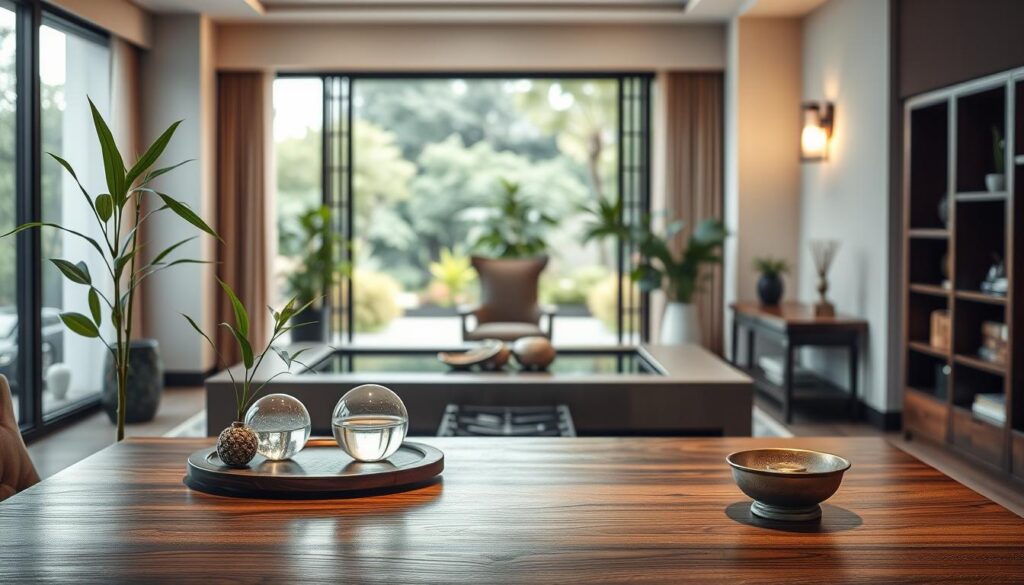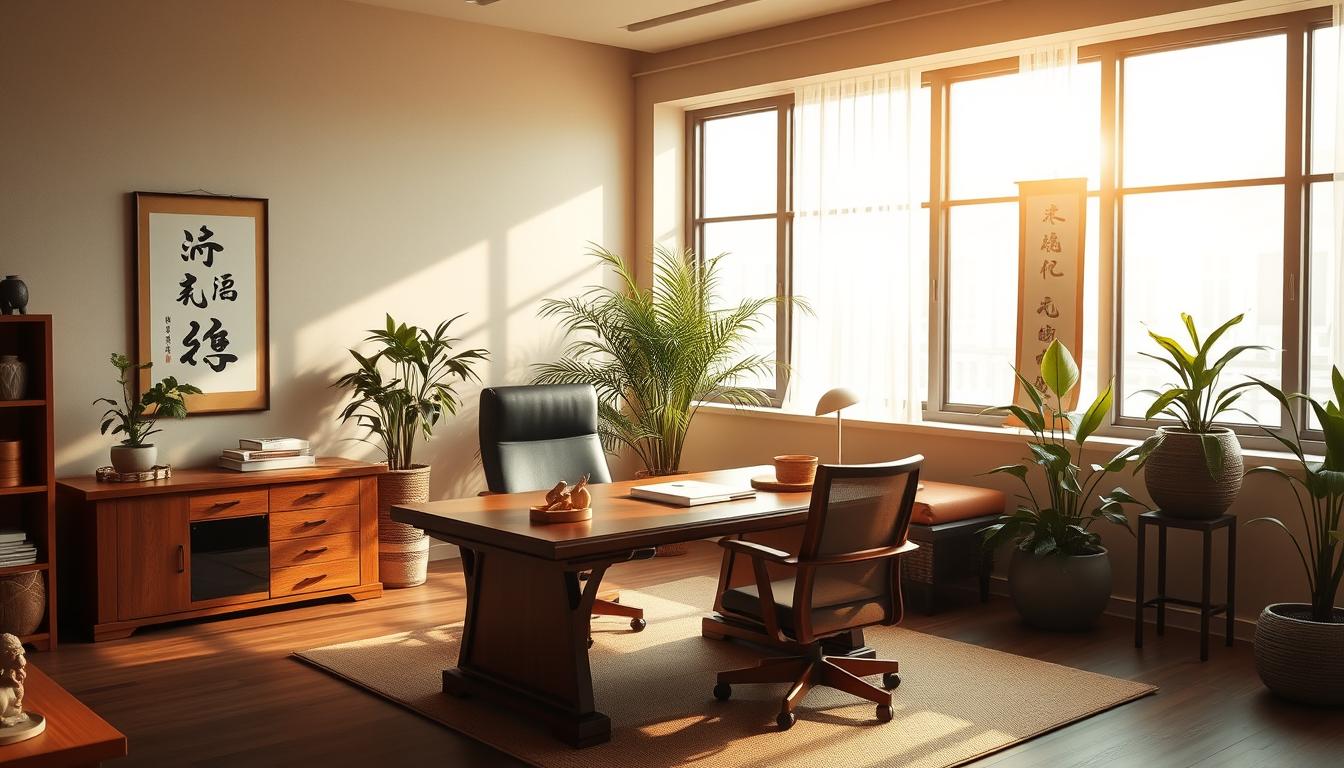Feng Shui, meaning “wind water,” comes from ancient Chinese thoughts. It focuses on making a balanced, harmonious environment. In a Feng Shui office, the idea is to boost work efficiency. It does this by changing office setups to invite positive vibes. A well-designed office can improve your focus and health, which helps you work at your best.
We’re going to look at key Feng Shui tips to make your office better. You’ll learn things like putting your desk where the energy flows well, known as the “command position.” We’ll also talk about using natural light and bright colors. These changes make a workspace that helps you feel good and work well. Stick with us, and you’ll learn how to transform your office into a productivity powerhouse.
Understanding the Basics of Feng Shui
Feng Shui is an ancient Chinese tradition, more than 3,000 years old. It teaches us to arrange spaces to encourage a positive flow of energy, or “qi.” This knowledge helps individuals make their surroundings better. It boosts productivity and overall well-being. By planning spaces carefully, we can bring balance and harmony into our lives.
Effective Feng Shui doesn’t require getting rid of all your stuff. It’s about mixing personal items and keeping organized. The five Feng Shui elements are Wood, Fire, Earth, Metal, and Water. They help direct energy in a room. Each one brings different vibes:
- Wood: Use plants, wooden furniture, and green colors to encourage growth and life.
- Fire: Lighting, candles, and red or orange shades can add energy and drive.
- Earth: Stones, ceramics, and earthy tones bring stability and keep us grounded.
- Metal: Metal objects and cool colors create a sense of clarity and focus.
- Water: Aquariums, fountains, and blue or black colors help with creativity and relaxation.
Color psychology also boosts Feng Shui’s impact. Blue helps with calmness and focus, which is great for detailed work. Green is for growth, making it perfect for creative spots. Red adds energy, suited for tasks that need a lot of effort. Yellow is for mental clarity, ideal for places where you brainstorm ideas. Knowing how these elements and colors interact enriches our workspace. It allows energy to flow and productivity to bloom.
The Principles of Feng Shui
Feng Shui is all about balance, especially between yin and yang. Yin brings calm and relaxation. Yang adds energy and action. It’s key to have a balance in the office to help you do your best work.
Putting your desk where you can see the door makes you feel in charge and sure of yourself. This setup helps you concentrate and get more done. Colors are also very important. For example, blue helps with talking, green supports growth, and neutral colors make things calm. All these create a well-balanced office feeling.
Choosing the right materials matters too. Wood furniture adds a sense of growth and energy, while metal pieces bring clarity and precision. Adding plants cleans the air and boosts positivity. It’s also important to keep things tidy and move easily around your space for the best energy flow.
Comfortable furniture is key because it helps you stay relaxed and work without pain, making you more productive and happier. Cleaning your desk often and using good storage keeps the energy right and helps you stay focused and efficient.
Mirrors can change how energy moves around, reflecting good vibes and avoiding bad ones. Pictures of nature or success can motivate you. It’s good to use furniture without sharp corners to keep the vibe good and help you work better.
The Importance of Balance and Harmony
In Feng Shui, creating a balanced office design is key for high productivity. This approach focuses on mixing yin and yang energies. Yin brings calm, which is great for deep thinking and getting projects done. On the other hand, yang boosts energy and motivation, which are essential for active tasks. Finding the perfect mix makes a workspace peaceful yet productive.
Setting up an effective office takes careful thought. Adding natural items like peace lilies and bamboo improves air and adds calm. Good lighting, especially from the sun, helps with focus and thinking. Colors also matter a lot. Green stands for nature, blue for knowledge, and yellow for smarts and wealth. Choosing the right colors can change the feel of an office.
Keeping a clean desk is important for positive energy. A neat space helps you concentrate and keeps you from getting distracted. Having your desk face the door, or the *command position*, makes you feel in charge and boosts work output.
Feng Shui and Energy Flow
The flow of energy in office spaces can really affect how much we focus and get done. To bring in positive vibes, it’s crucial to arrange our work area thoughtfully. The Bagua map points out nine key spots linked to health, money, and connections.
It’s key to place your desk so you can see the entrance but not be right in front of it. This “command position” boosts awareness, self-assurance, and sharpens decision-making.
Keeping your space tidy is vital for good energy. Messy places can block positive vibes and make it hard to think clearly. Adding a water feature and some greenery brings in water and wood, making the space feel better.
- Choose a sturdy and comfortable desk paired with a supportive chair for ergonomic benefits.
- Use a desk blotter to incorporate the earth element, enhancing stability.
- Select colors according to Feng Shui’s five elements: red/orange for fire, green for wood, black/gray for water, brown/ochre for earth, and white/metallic for metal.
Focusing on energy flow and a neat workspace helps create a productive and peaceful vibe. Using these Feng Shui tips can make an office feel more energized and pleasant.
The Role of Feng Shui in Enhancing Productivity
Feng Shui is key to making workspaces better. A place that is well-set and calm helps clear our minds. It also boosts our focus and creativity. For instance, having a desk face the door with a wall behind lessens distractions. This setup makes us feel more in control.
Adding plants brings in wood energy, sparking creativity and growth. Bright lights, or yang energy, make work areas more lively, which helps us do more. Using colors wisely affects how we feel, with blue aiding in communication and red increasing motivation. Filling bookshelves with positive books can push our professional development. Art pieces can help us focus and be more creative too.
Keeping our work area tidy cuts down stress and distractions. It’s crucial to clean often and use smart ways to store things. Setting up our furniture right helps chi flow smoothly, which ups our energy and work output. Adding water features, like a small fountain, brings calm. Earthy decorations add stability, key for a good work environment.
Putting items in the wealth corner might help us do well financially, adding to our productivity goals. Applying Feng Shui lets us set up a place that boosts our work and clears our mind.
Steps to Designing Your Feng Shui Office
To design a Feng Shui office, think carefully. Put your desk in the “command position” at the room’s back. Make sure it faces the door. This setup improves your control and visibility of the space. Chairs should have high backs or be placed against the wall. This gives a feeling of support and safety.
Stay away from sharp corners known as “poison arrows”. Use rounded furniture to make the space feel softer. Adding plants can soften sharp corners too. Introduce natural elements like plants and water features for positive energy.
Choose art that includes Feng Shui elements to enhance the office’s energy. Desks made of brown wood are more stable than glass ones. Place your desk near windows to use natural light. This helps reduce tiredness and stress.
Keeping your workspace tidy is crucial. Clean your desk often to keep distractions away. A neat space helps you concentrate better. Use smells like lavender or citrus to make the air relaxing. Make sure everyone likes the scents.
Mirrors can make the office feel bigger and boost energy flow. Use adjustable desks and air purifiers for a healthier workspace. Eco-friendly designs are good for the planet and match the Feng Shui outlook for 2025.
Keep the wealth corner of your office clean to attract money and chances. Use vertical storage to save space and stay organized. Keeping cables tidy also makes the space calmer.
Choose colors wisely. Blue, green, purple, and red help with positivity and work. Use red in small amounts to keep the energy right. Whites and creams help with thinking clearly, while browns create a steady feel. A motivational quote on the wall can boost energy and creativity.
Choosing the Right Location
Finding the perfect office spot is key to getting more done and feeling good. A bright workspace can lift your spirits and spark new ideas. But, a bad setup, like turning your back to the entrance, might make you feel uneasy.
So, try facing the door to feel in charge.
Where you put your desk impacts how well you can focus. To keep your attention, don’t sit facing straight out a window, as it’s distracting. Putting your desk diagonally towards the entrance, especially from the East-Southeast or North-Northeast, gives you a powerful spot with a clear view of the door.
This arrangement boosts your sense of authority and safety.
Adding beauty to your work area can make it even better. Put something special, like plants or crystals, in the top left part of your desk. This is believed to bring good luck and money. Also, having a window to the side lets in sunlight and gives you a chance to pause and refresh.
Keeping your office tidy is crucial. A clean desk helps good vibes flow, making you think clearer and work better. Choosing the right spot and setting up your desk well can improve your work life and bring peace.
Feng Shui Office Productivity: Incorporating the Five Elements
Bringing the five elements of Feng Shui into your office makes it balanced and supportive. Wood, fire, earth, metal, and water each have a role. They boost productivity and well-being.

Wood stands for growth and life. Add plants or wooden items to bring this energy. This not only makes you more creative but also connects you with nature.
Fire brings energy and passion. Use bright colors like red in art or lights. Warm tones uplift motivation and add excitement to your space.
Earth is about calm and stability. Use natural materials and soft tones to feel grounded. Crystals or stones add to this feeling, enhancing security.
Metal means clarity and efficiency. Metal objects, like lamps or mirrors, boost focus. They help make your space tidy and productive.
Water is for flow and being open to change. Adding a small fountain or aquarium, especially in the north, is good. These water elements improve wellness and attract success.
Using these five Feng Shui elements makes your workspace both efficient and peaceful. Each one adds to a positive and energetic atmosphere. Here, creativity and work go hand in hand.
Using Color in Feng Shui Design
Colors are crucial in Feng Shui, impacting mood, energy, and work efficiency. They do more than just look pretty. They can change how people feel in their workspace.
Red, linked to fire, brings inspiration and passion. It’s great for creative areas, boosting focus and drive. Blue, on the other hand, relates to growth and compassion. It helps keep teams calm and communicate well.
Green signifies renewal and freshness, perfect for livening up dull spaces. Yellow encourages joy, harmony, and teamwork, making it ideal for learning and working together.
Each color has its meaning. Black and dark blue, for water, mean wisdom and help focus. White, beige, and silver, for metal, promote clarity and organized thinking, aiding in smart decisions.
Choosing colors wisely is key. Don’t overpower a room with one shade. Use a mix to create a balanced, inviting space. Using Feng Shui colors thoughtfully can boost energy and productivity at work.
Maintaining Your Feng Shui Office for Sustained Productivity
Keeping Feng Shui right in your office helps boost productivity and well-being. Clean and declutter every day to keep the energy fresh. This makes your mind clear and work better.
Think about where your furniture is, especially your desk. Have your desk face the door but with a wall behind you. This setup makes you feel in control and positive, helping you work well all day.
Adding nature, like plants or crystals, improves the energy and balance in your space. Use plants like the areca palm to clean the air and make things peaceful. Maybe add a mirror to keep away bad vibes or a salt lamp for gentle light.
Open storage brings in new energy, and closed storage keeps things organized. Make sure walkways are clear for energy to move freely. Use calming colors like blue and green to help you focus and feel at ease.
Check your office layout and decoration regularly to match your changing needs. Add things that keep you motivated or move furniture to refresh the space. Ending your day with a clean desk sets you up for success tomorrow, keeping productivity high over time.
Creating an Ergonomic Work Environment
Designing an ergonomic work environment is key to better office comfort and health. An effective setup reduces strain and boosts productivity. Key factors to consider include:
- Decluttering the workspace to reduce visual noise and improve focus.
- Investing in ergonomic furniture such as a chair with high-density cushioning and adjustable features.
- Using a Saddle Chair for dynamic work situations.
- Incorporating a standing desk to alternate between sitting and standing, providing better posture options.
- Positioning the monitor at eye level using a Monitor Arm to maintain good neck alignment.
- Allowing natural light in to enhance mood and concentration.
- Utilizing calming scents like lavender, vanilla, and lemongrass to boost productivity.
- Placing the desk in a commanding position to optimize energy flow and visibility.
- Incorporating wood elements to introduce a sense of natural, calming energy.
To get the most from Feng Shui and ergonomics, don’t sit in line with the door. Pick a chair that supports your spine for better posture. This improves health at work.
Natural light should hit your desk, depending on window direction. Plants like succulents clean the air and boost Feng Shui energy. Colors like blue and green boost mood and productivity, following Feng Shui.
Keeping your space tidy helps you think clearly and be more ergonomic. Make sure your monitor is right at eye level. Also, place your keyboard so your hands are comfy. Don’t forget to stretch every hour for your health.
Add personal touches to your space with family photos or sayings that inspire you. Ambient sounds or music also enhance your workspace’s Feng Shui energy.
Bringing in Natural Light and Plants for Positive Energy
Adding natural light and plants to an office boosts mood and work output. Studies show greenery can up focus and efficiency by 15%. This makes a workspace full of energy, great for creativity and concentration.
Plants do more than just make the office pretty; they clean the air too. Choices like the Rubber Plant and Snake Plant love low light, perfect for office life. The Rubber Plant brings wealth and fresh air. The Snake Plant, good for corners, brings protective vibes.
- Heart Leaf Philodendron: Promotes relaxation with its soft rounded leaves.
- Lucky Bamboo: Associated with career improvement and happiness.
- Money Tree: Symbolizes balance and abundance.
There’s more to natural light than helping plants grow. It lifts our spirits and energy, making offices feel better. Plant care is key — clear dead leaves and use gentle bug control to keep plants healthy. Ignored plants can do more harm than good, draining the positive vibe we want.
Using natural light and plants smartly can make a work spot energetic and balanced. This approach follows Feng Shui’s core ideas. These methods boost creativity and turn a regular space into one where work thrives.
Conclusion
Using Feng Shui in your office design brings balance and boosts productivity. Adding the right desk color, shape, and placement helps. This creates a space for clear thinking and focus. Such changes lead to better efficiency and career success.
Adding plants and calming features like fountains also boosts focus and peace. A tidy workspace fits with Feng Shui and lets energy flow well. This reduces distractions. This way, your office supports your well-being and makes work more satisfying.
Adopting Feng Shui isn’t just about looks; it improves your work life. It encourages inspiration, creativity, and growth in your career. Remember, Feng Shui is more than productivity. It’s about building a space where you and your work can flourish.
FAQ
What is Feng Shui?
How can Feng Shui improve office productivity?
What are the core principles of Feng Shui?
Why is the desk position important in Feng Shui?
How do color choices affect Feng Shui?
What role do natural elements play in Feng Shui?
How can I maintain a Feng Shui office?
What ergonomic considerations should I keep in mind for my office?
How can I integrate the five key elements of Feng Shui into my office?
What is the significance of decluttering in Feng Shui?
Content created with the help of Artificial Intelligence.



